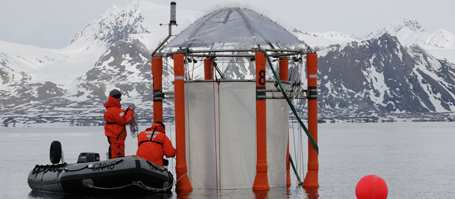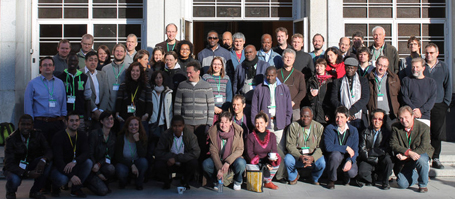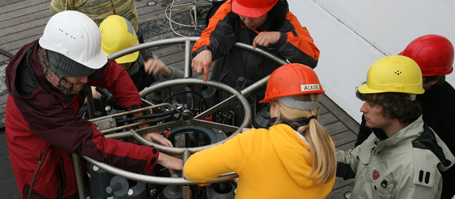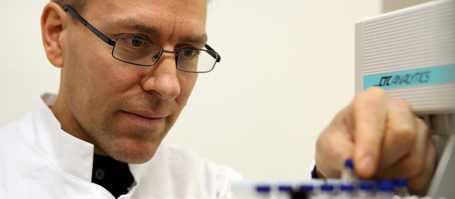In the past ten years, research has shown that ocean acidification – the sinking of the pH value of the sea water due to the absorption of carbon dioxide from the atmosphere (CO2) – influences marine wildlife in numerous ways. Reactions to ocean acidification have been examined mostly in short term experiments. Yet how do complex marine biocoenoses react to ocean acidification and can they adapt over a longer period of time? In order to explore these questions, intricate experiments lasting several months with natural biocoenoses are necessary. “Thanks to an improvement in Kiel’s KOSMOS mesocosms, the first long term experiments are now possible” emphasizes Prof. Ulf Riebesell. The professor for biological oceanography at GEOMAR Helmholtz Centre for Ocean Research Kiel is coordinating the BIOACID project and the KOSMOS mesocosm experiment.
GEOMAR researchers are now installing ten of these oversized test tube-like constructions in the Swedish Gullmarfjord using the research vessel ALKOR. With these they can observe the reaction of the plankton community over a period of five months. During this period of time mostly microscopically small plankton run through many generations and different compositions of species alternate” explains Riebesell. “The short generation time of the plankton and the fast change within the biocoenosis enable the investigation of the adjustment process in a natural habitat.” Riebesell and his colleagues hope to thus make better predictions on the long term effects of ocean acidification.
A further focus lies in the effects of ocean acidification on the development of fish. If the biocoenosis at the start of the food chain changes, the entire food web, including fish, will suffer the consequences. In order to examine this question, the scientists are placing herring and cod larvae in the mesocosms and following their development in relation to the level of acidification. First studies on cod larvae have shown that their development is directly impaired by ocean acidification.
The scientists from Germany, Sweden, Finland, Great Britain and the Netherlands have chosen the Sven Lovén Centre for Marine Sciences in Kristineberg as their base. Daily, they leave the centre in small boats to take measurements and collect samples from the mesocosms for laboratory analyses. “The different teams examine the development and productivity of the plankton community, changes in the food web, the material and energy conversion, as well as the production of climate active gases”; thus describes Riebesell the range of questions that the KOSMOS 2013 experiment covers. “This year a total of 62 molecular, evolutionary, marine and fisheries biologists, physiologists, ecologists, biogeochemists and atmospherical chemists are involved in the project. Thanks to the interdisciplinary approach and the unusually long duration of the experiment, we hope to gain fundamentally new insights.”
The scientists will be blogging about their work in Kristineberg from the end of January onwards. The “KOSMOS 2013” blog can be found on the BIOACID website www.bioacid.de
Note for Journalists:
The mesocsms will be loaded onto the research vessel ALKOR on Monday 21st January (GEOMAR East Shore). Provided the weather is good, the mesocosms will be installed on Thursday and Friday, 24th and 25th January in the Gullmarfjord.
Image Material:
Download images at www.geomar.de/n1092. Video footage on request.
Contacts:
Prof. Dr. Ulf Riebesell (GEOMAR, FB2-BI), Tel.: (0049) 431 600-4444
uriebesell@geomar.de
Maike Nicolai (GEOMAR Communication & Media) Tel.: (0049) 431 600-2807
mnicolai@geomar.de
…



